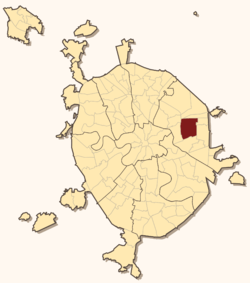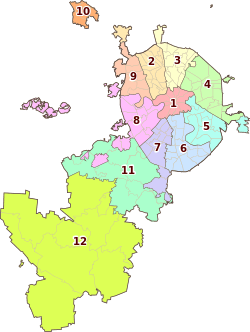Izmaylovo District
| Izmaylovo District район Измайлово (Russian) | |
|---|---|
 Location of Izmaylovo District in Moscow | |
| Coordinates: 55°46′37″N 37°44′48″E / 55.77694°N 37.74667°ECoordinates: 55°46′37″N 37°44′48″E / 55.77694°N 37.74667°E | |
.png) |
.png) |
|
| |
| Location | |
| Country | Russia |
| Federal subject | Moscow |
| Statistics | |
| Population (2010 Census) | 102,837 inhabitants[1] |
| - Urban | 100% |
| - Rural | 0% |
| Time zone | MSK (UTC+03:00)[2] |
| Izmaylovo District on WikiCommons | |
Izmaylovo District (Russian: райо́н Изма́йлово) is a district in Eastern Administrative Okrug of the federal city of Moscow, Russia. Population: 102,837 (2010 Census);[1] 110,099 (2002 Census).[3]
It is a historical part of Moscow, the ancestral land of the Romanov noble family.
History

The history of the village of Izmaylovo goes back to 1389. Since the days of Ivan the Terrible it was an estate of boyars in the Romanov family. In 1654, it was inherited by Alexis of Russia, who built an château on an artificial island around 1664—1690. At about the same time, in 1671—1679, a medieval church was rebuilt into Church of Intercession of the Most Holy Theotokos. The château was later expanded by architects Konstantin Thon and Mikhail Bykovsky into Izmaylovo Estate. It survived the fire of 1812, and is now an outdoor tourist destination.
Peter the Great grew up in Izmaylovo and had been known for sailing a small boat which he discovered in the storage of his great grandfather Nikita Romanov. This boat is now in Central Naval Museum in St. Petersburg, and is credited as the "grandfather of the Russian Navy".
According to the Russian population audit of 1800, the population of Izmaylovo was 121 homesteads comprising 753 people. The village continued to grow slowly until the October Revolution, when the buildings were confiscated and given to laborers. In 1924, a part of Izmaylovo became known as Bauman township, named after the Russian revolutionary Nikolay Bauman. This name is still retained in the Baumanskaya metro station and Bauman University, both located in Izmaylovo.
In 1935, Izmaylovo became a part of Moscow. In 1980, a group of hotels was built near the Partizanskaya metro station to accommodate visitors of the 1980 Summer Olympic games in Moscow.
Geography
Izmaylovo borders Preobrazhenskoye and Sokolinaya gora Districts in the west, Perovo District in the south, Ivanovskoye District and MKAD in the east, and Golyanovo District in the north. Almost a half of its territory is occupied by Izmaylovsky Park, which, with an area of 12 square kilometers (4.6 sq mi), is one of the largest urban parks in the world and is about 3.5 times the size of the Central Park in New York. Serebryanka River, which flows through the park, is the main river in the district.
Izmaylovo Kremlin
Near the Izmaylovo Estate there is a newly built wedding complex, built in the style of a medieval Russian citadel. It is built in a pseudo-Byzantine style, based loosely on what palaces in Russia looked like in pre-Petrine times, but more inspired by drawings of Russian fairy tales. This complex is used for civil weddings as it has a wedding palace, a restaurant and bars. However, it is also used as an amusement park/open-air museum for children on the theme of 'Old Russia'. There is a reconstruction of a wooden Russian church that used to dot the Russian countryside before the Russian Revolution but it is not used for weddings. There is also a big market that sells souvenirs amongst other things.
See also
References
Notes
- ↑ 1.0 1.1 Russian Federal State Statistics Service (2011). "Всероссийская перепись населения 2010 года. Том 1" [2010 All-Russian Population Census, vol. 1]. Всероссийская перепись населения 2010 года (2010 All-Russia Population Census) (in Russian). Federal State Statistics Service. Retrieved June 29, 2012.
- ↑ Правительство Российской Федерации. Федеральный закон №107-ФЗ от 3 июня 2011 г. «Об исчислении времени», в ред. Федерального закона №248-ФЗ от 21 июля 2014 г. «О внесении изменений в Федеральный закон "Об исчислении времени"». Вступил в силу по истечении шестидесяти дней после дня официального опубликования (6 августа 2011 г.). Опубликован: "Российская газета", №120, 6 июня 2011 г. (Government of the Russian Federation. Federal Law #107-FZ of June 31, 2011 On Calculating Time, as amended by the Federal Law #248-FZ of July 21, 2014 On Amending Federal Law "On Calculating Time". Effective as of after sixty days following the day of the official publication.).
- ↑ Russian Federal State Statistics Service (May 21, 2004). "Численность населения России, субъектов Российской Федерации в составе федеральных округов, районов, городских поселений, сельских населённых пунктов – районных центров и сельских населённых пунктов с населением 3 тысячи и более человек" [Population of Russia, Its Federal Districts, Federal Subjects, Districts, Urban Localities, Rural Localities—Administrative Centers, and Rural Localities with Population of Over 3,000] (XLS). Всероссийская перепись населения 2002 года [All-Russia Population Census of 2002] (in Russian). Retrieved August 9, 2014.
Sources
- Izmaylovo in Moscow Encyclopedia (Russian)
External links
| ||||||||||||||||||||||||||||||||||||||||||||||||||||
